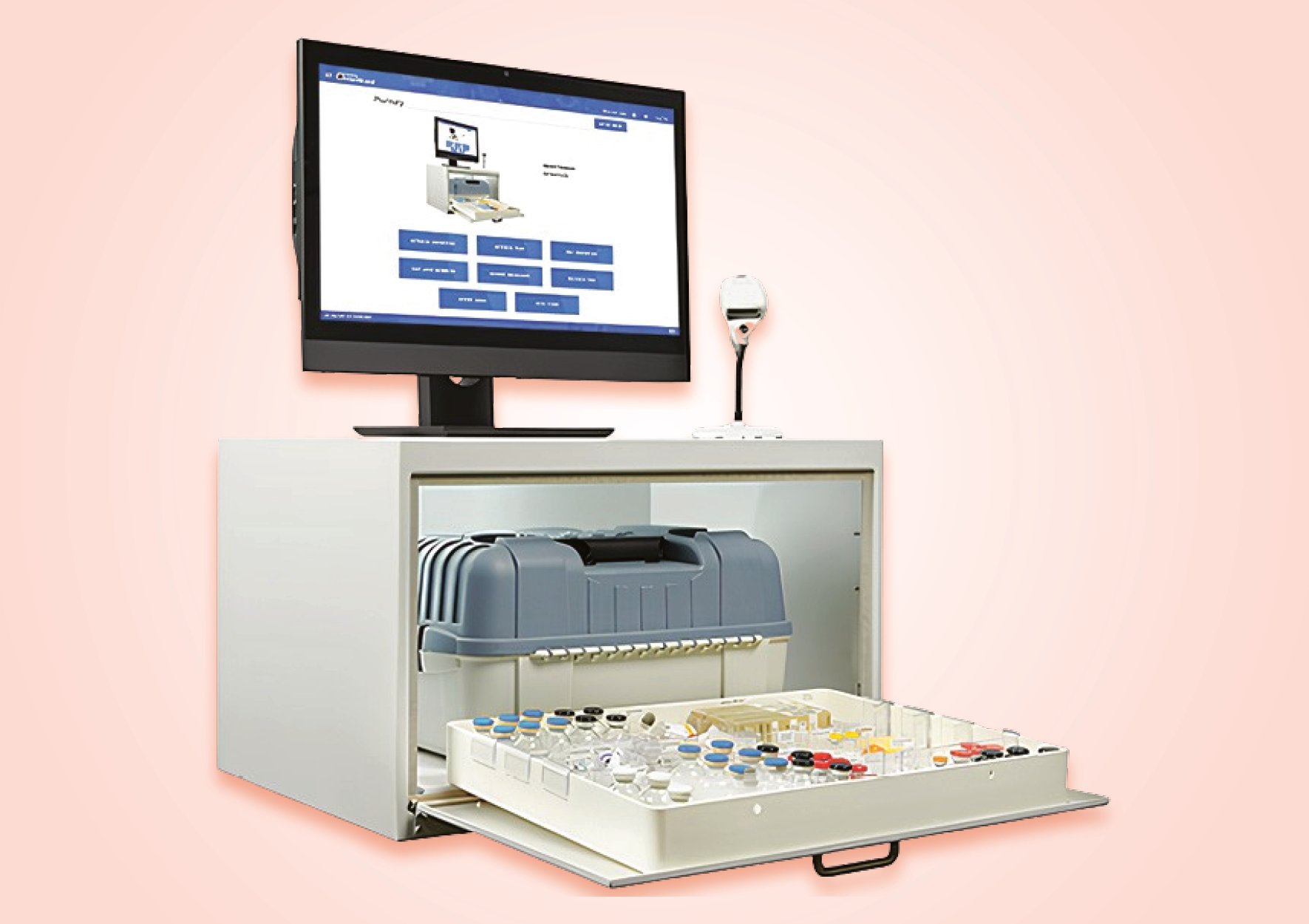- Show Menu
- Contact Us
- FAQs
- Reader Service
- Survey Data
- Survey Winners
- Testimonials
- Upcoming Events
- Webinars
- White Papers
Bringing the Nuclear Medicine and Pharmacy Departments into Concert
Pharmacy Purchasing & Products: What role should pharmacy play in ensuring safety and compliance for radiopharmaceuticals in the hospital?
Patricia C. Kienle: Because radiopharmaceuticals are drugs as well as prescription agents, the pharmacy department—and the director of pharmacy in particular—is responsible for their oversight, just as they are for all medication use in the hospital. While distribution issues are less of a concern because the nuclear medicine department manages these, we must treat radiopharmaceuticals like any other medication.
PP&P: What are the regulations guiding radiopharmaceutical oversight?
PK: Under the CMS Hospital Conditions of Participation, in-house preparation of radiopharmaceuticals is by, or under, the direct supervision of an appropriately trained, registered pharmacist, or doctor of medicine or osteopathy. Each of the three accrediting organizations in the US—The Joint Commission (TJC), Healthcare Facilities Accreditation Program (HFAP), and Det Norske Veritas (DNV)—has incorporated this regulation into their accreditation standards (although TJC did drop the word direct).
PP&P: Are there other regulatory issues to consider?
PK: Directors of pharmacy need to be familiar with USP chapters and as they affect radiopharmaceuticals. The nuclear medicine department must be familiar with the nuclear regulatory requirements in their jurisdiction. Lastly, each state has specific requirements for how the nuclear medicine departments within a hospital are licensed. Be sure you are in compliance with these requirements and review whether your state has any specific scope of practice issues for nuclear medicine technologists.
PP&P: How can pharmacy become familiar with the services provided by the nuclear medicine department?
PK: I recommend taking an internal field trip. Set up a time with the director of nuclear medicine to review the equipment and practices within their department.
On the initial visit, review policies and procedures. It is important to meet the staff, and become familiar with the nuclear medicine technologists’ activities, including any activities outside of their department, such as floor visits and any injection administration. In addition, check the department as you would any medication area that you review on a periodic basis. Keep in mind that TJC and other accreditation organizations, the state, and CMS expect the pharmacy to periodically review all medication storage areas in the hospital. Apply the same checklist used in other medication areas, adding issues specific to this department, such as the storage requirements for radioactive substances. While a variety of staff often conducts the medication area inspections, I would recommend designating a single staff member to inspect the nuclear medicine department to ensure the proper precautions are taken and the inspections are consistent.
PP&P: What questions should pharmacy ask the nuclear medicine department?
PK: Start by asking what dosage forms are in use and review what the department obtains from the outsourced nuclear pharmacy. There are three types of products that could be supplied by the outsourcer:
- Patient-specific unit dose syringes, which are referred to as “pigs”
- Multi-dose vials
- Cold kits
Both the pigs and the multi-dose vials are considered unit dose by TJC.
It is also important to ask whether the nuclear department has a Molybdenum-99 generator. Because most nuclear medicine departments outsource much of their compounding, it is pretty unusual to find a generator in the hospital. However, if there is a generator in the hospital, a nuclear pharmacist or qualified physician must be on site to oversee its use and the subsequent radiopharmaceutical compounding. Next, find out if any non-radiopharmaceuticals are being prepared in the nuclear medicine department, such as adenosine, dipyridamole, and sincalide. Often these are prepared in the nuclear medicine department simply because it has been done this way for years. I strongly recommend these be prepared in the hospital pharmacy instead, to ensure the proper patient safety procedures are applied to these drugs.
PP&P: How commonly used are kits?
PK: Though kits may be used infrequently, they are commonly found in most hospital nuclear pharmacy departments. There are some institutions with a unit-dose-only policy requiring patient-specific unit doses for all procedures, however, other facilities rely on the compounding of kits for immediate use during after-hours and weekends.
Because the TJC considers kit compounding to be an in-house preparation, not a unit dose product prepared in the nuclear pharmacy with a qualified pharmacist overseeing it, the use of kits raises regulatory issues that pharmacy will need to address. The preparation of kits requires the supervision of an appropriately trained and credentialed pharmacist or physician on site.
PP&P: So pharmacy should oversee the system for ordering and delivering non-radiopharmaceuticals used in the nuclear medicine department?
PK: Yes, pharmacy should manage the non-radiopharmaceuticals used within the nuclear medicine department, as it does the rest of the medications in the hospital. It is important that these preparations are ordered, prepared, and delivered in a timely manner. Some of these preparations are weight-based, which is a more complicated process, and should be prepared in a hospital pharmacy under the appropriate USP conditions.
While it may seem overwhelming at first, managing these drugs is really no different from managing the medications for the rest of the hospital. There are scheduled procedures, the medications can be made in the sterile preparation area, and they should be made in ISO 5 conditions, which may not be the environment in the nuclear medicine department. We need to apply the same patient- and medication-safety standards that we use for any other drug in the rest of the hospital.
PP&P: How do you determine whether the nuclear medicine department is under control from a medication standpoint?
PK: Of course we are not looking at control from a radioactivity standpoint, but we are looking to determine whether there is control from a medication management and safety standpoint, and again it is no different from the assessments we do in other departments throughout the hospital. While pharmacy may be comfortable with the processes on nursing units, it is the other areas that we rarely reviewed until recently—like imaging—that require closer examination. Generally, pharmacy should find a very positive attitude toward medication safety, as the Society of Nuclear Medicine has been very good in keeping their members up-to-date on medication safety and USP in particular. I have yet to find a nuclear medicine department in recent years that was not well versed in . While it is not likely that you will uncover many problems in this area, pharmacy is expected to be responsible for ensuring these controls are in place.
PP&P: What kind of oversight should pharmacy have in the purchasing process?
PK: Because the nuclear medicine department has an established relationship with the nuclear pharmacy and knows the patient schedules, it makes sense for this department to continue managing the purchasing process in most cases. Pharmacy needs to become familiar with the suppliers in order to provide oversight and ensure that all of the medications are listed on the formulary and are sourced from an FDA-approved manufacturer. Overseeing the outsourced nuclear pharmacy is much like overseeing an outsourced sterile compounder: The outsourcer must provide a statement that they conform to USP and . In addition, pharmacy must keep administration apprised of their oversight to meet TJC’s leadership standard.
PP&P: How involved should pharmacy be with the outsourced nuclear pharmacy?
PK: It is very appropriate for pharmacy to visit the nuclear pharmacy and review the facilities. While the end product is different, look for the same processes and quality assurance that you expect from your sterile compounding outsourcer.
PP&P: How do safety issues differ in the nuclear medicine department?
PK: In pharmacy, when we talk about medication safety, we immediately think of patient safety, but in nuclear medicine, the first safety issue is radiation safety for staff and patients. Nevertheless, pharmacy does not need to learn the details of the nuclear regulatory commission regulations as you can rely on the expertise of your hospital’s radiation safety officer and the nuclear pharmacy.
PP&P: What about offsite clinics?
PK: Whatever occurs in the hospital must also occur in the offsite clinics, if those sites are surveyed and accredited in the same manner as your main facility. Clinic staff can be trained to conduct the regular medication area inspections as it is not required that a pharmacist or pharmacy technician conducts every inspection. However, I would recommend a pharmacy staff member conduct a periodic inspection, perhaps quarterly. Regardless of who conducts the inspection, all involved must follow the same training and competency documentation.
PP&P: Should the radiopharmaceuticals used in the facility be included on the formulary?
PK: Just like any other medication, there should be a listing of all radiopharmaceuticals in routine use, with the P&T committee approving any off-label indications. The nuclear medicine department should provide a list of the drugs they use, what they are used for, and include whether the product and indication are FDA-approved. Generally the P&T committee will rely on the expert opinion of the imaging staff for any further details.
PP&P: Do you have any additional advice for pharmacists embarking on overseeing nuclear medicine practices?
PK: Pharmacy should concentrate on the following five issues to ensure they are in sync with the medication management standards: the scope of service, facilities, procedures, preparation of products other than radiopharmaceuticals, and the chain of oversight.
Pharmacy should not think of this as an overwhelming challenge, rather, I think most will find these areas to be well run with clear communication between the nuclear medicine department and the nuclear pharmacy. Pharmacy’s new role is to incorporate the patient safety controls that we have implemented in the rest of the hospital. Keep in mind that these are relatively easy fixes, and furthermore, this does not involve an insurmountable number of patients or drugs.
We do need to be clear that it is not appropriate for radiopharmaceuticals to be brought into the hospital pharmacy. Only the nuclear medicine department has been licensed and designed for storage and administration of these medications, and that is where this must occur. Pharmacy’s role is to review the delivery process for these products to ensure it is secure and the products are appropriately handled.
Patricia C. Kienle, RPh, MPA, FASHP is the director of accreditation and medication safety for Cardinal Health. She is the recipient of an MPA in health service administration from Marywood College in Pennsylvania, a BSc in pharmacy from Philadelphia College of Pharmacy and Science, and has completed an executive fellowship in patient safety from Virginia Commonwealth University.
Digital Edition
PP&P is now available online in the exact layout and appearance of the print edition, and includes more interactive features, such as the ability to access websites and request information with the click of a mouse. To view this article in the digital edition, CLICK HERE.
Like what you've read? Please log in or create a free account to enjoy more of what www.pppmag.com has to offer.








